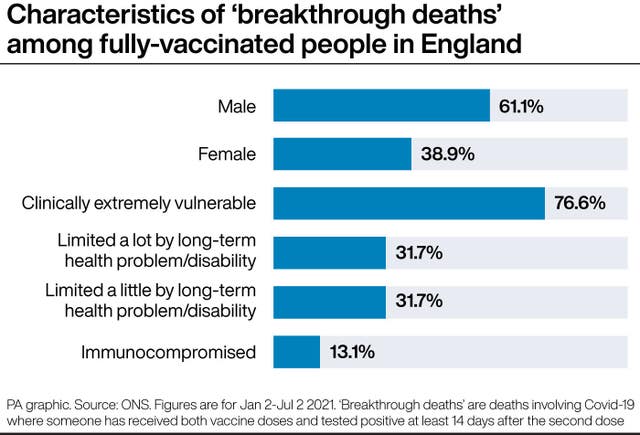Just 1% of deaths involving Covid-19 in England were fully vaccinated
The ONS published the figures for the first seven months of this year.

People who were fully vaccinated against Covid-19 accounted for only 1% of all deaths involving coronavirus that occurred in England in the first seven months of this year, new analysis shows.
Most were infected before they had received both jabs or had tested positive for Covid-19 within 14 days of their second dose.
The figures have been published by the Office for National Statistics (ONS).

They show the risk of death involving Covid-19 is consistently lower for people who receive two vaccinations compared to one or no vaccination.
Of the 51,281 deaths involving Covid-19 that took place in England between January 2 and July 2, 640 (1.2%) were people who had received both vaccine doses.
This total includes people who had been infected before they were vaccinated.
Some 458 deaths (0.8%) were people who died at least 21 days after their second dose.
Just 256 deaths (0.5%) were people who were both fully vaccinated and who had their first positive PCR test at least 14 days after their second dose.
Some deaths are expected in vaccinated individuals, as the number of people who have received both doses is high and no vaccine is 100% effective, the ONS said.
A detailed breakdown of data is available for 252 of the 256 people who died after having received both jabs and who first tested positive at least 14 days after the second dose – what the ONS describes as “breakthrough” deaths.
It shows that just over three-quarters of these deaths (76.6%) occurred in those who were clinically extremely vulnerable – a slightly higher proportion than for other Covid-19 deaths (74.5%) and non-Covid-19 deaths (69.7%)
Some 61.1% of breakthrough deaths occurred in males, which is higher than for other deaths involving Covid-19 (52.2%) and non-Covid-19 deaths (48.5%).
Professor Gino Martini, chief scientist for the Royal Pharmaceutical Society, described the figures as “extremely reassuring”.
“The data shows that people are much better protected from the virus after two doses, and hopefully this will inspire others to get the vaccination to protect themselves and others,” he added.
Kevin McConway, emeritus professor of applied statistics at the Open University, said the figures were a useful a reminder that there will “always be people, perhaps because they have weakened immune systems, perhaps for some other reason, that aren’t protected as well by the vaccines than the rest of us.
“That’s an important reason why levels of infection need to be kept low, so that other people don’t pass on the infection to those whom the vaccines don’t protect well – and that’s another reason why it’s important for as many people as possible to be vaccinated.”
Dr Nikki Kanani, GP and deputy lead for the NHS Covid vaccination programme, said: “The NHS Covid vaccination programme has been incredibly successful thanks to the non-stop efforts of staff and volunteers across the country who have now delivered more than 77 million vaccinations, with over eight in 10 adults having had both doses, giving them maximum protection against coronavirus.
“This analysis is another reminder of how effective the vaccine is at preventing serious illness and death from Covid-19, so, if you are yet to receive your life-saving vaccine, I urge you to come forward today and protect yourself, your friends and your loved ones.”





